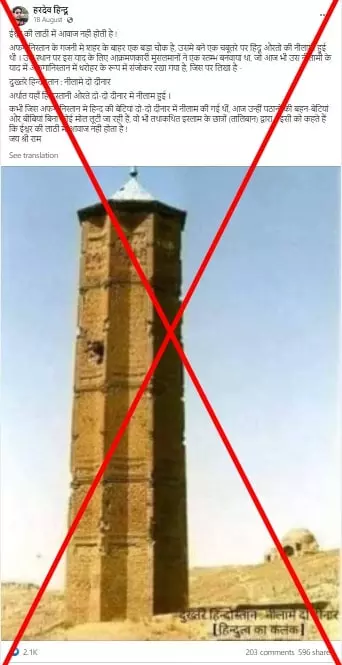Multiple social media posts have shared an image that they claim shows the ruins of an Islamic building in Afghanistan containing Persian-language "inscriptions that commemorate the mass auction of Hindu women". But these posts are false, according to multiple scholars. The image shows a minaret on the outskirts of the Afghan city of Ghazni with Arabic-language inscriptions that do not make any reference to the auction of Hindu women, a historian told AFP.
Also Read: 2015 Image Of Militant Held In Kashmir Shared As Accused in Pakistan Lynching Case
The image was shared here on Facebook on August 18, 2021.
It appears to show a minaret -- an Islamic building that typically stands adjacent to a mosque.
"Hindu women were auctioned at a terrace in a big square on the outskirts of the city of Ghazni in Afghanistan by invading Muslims who also built a minaret to commemorate this mass auction", the Hindi-language post states.

Screenshot of the misleading post taken on November 25, 2021 The post goes on to claim: "It is inscribed on the pillar – 'Dukhtar-e Hindustan': Sold for Two Dinars. It is here that Indian women were sold for two dinars each. Afghanistan where daughters of Hind were sold for two dinars, today the sisters and daughters of the same Pathans are being looted for free and that too by the so-called students of Islam (Taliban). This is god's justice. Long live Rama."
Text overlaid at the bottom of the image also states: 'Dukhtar-e Hindustan': Sold for Two Dinars – India's Shame."
The image recirculated online after Taliban seized control of Afghanistan in August 2021.
The image was shared alongside a similar claim here and here on Facebook; and here and here on Twitter.
It has also been shared thousands of times alongside a similar claim in Indian languages including Hindi, Marathi and Punjabi.
Also Read: Car Crash In India Shared As Collision In Myanmar With Reference To Junta
But these posts are false.
Minaret in Ghazni
Multiple scholars confirmed to AFP the image in the posts shows the minaret of Bahram Shah in the Afghan city of Ghazni, which is located southwest of the capital Kabul.
Bahram Shah was a 12th-century ruler who ordered the construction of the minaret.
The minaret does not contain the inscriptions indicated in the false posts, they say.
Manan Ahmed, associate professor of Columbia University's Department of History and a historian of South Asia, called the posts "a forgery".
"I can confirm that no structure was built to celebrate or commemorate the sale of 'Hindu' women", he told AFP.
Arabic inscriptions
Viola Allegranzi, a historian specialising in monuments from the Ghaznavid period, also told AFP the purported inscriptions in the posts are "fake".
"'Dokhtar-e Hindustan' means 'the daughter/girl from Hindustan' in Persian", Allegranzi said.
"The sentence is clearly a fake reading of the inscription on the minaret. [The inscription] is in Arabic and contains the name and titles of the Ghaznavid Sultan Bahram Shah."
"A few historical monuments survive from the Ghaznavid and Ghurid period in Ghazni (late 10th to early 13th century), and none was meant to commemorate an auction of women."
Also Read: No, Guinness Has Not Given A Sudanese Model The Darkest Complexion Award
Allegranzi directed AFP to a reading of the inscriptions in the minarets in the region published by French scholar Janine Sourdel-Thomine in 1953.
The Arabic text found on the panels, and cited in Sourdel-Thomine's research paper, translates to: "In the name of God the merciful: the great sultan (king) the king of Islam, the right hand of the state, the keeper of the nation, Abou El Mouzaffar Bahram Shah."
Abou El Mouzaffar Bahram Shah is another name for Bahram Shah.
There is no reference to a so-called "auction" of Indian women in the paper.
Viral hoax
AFP found the earliest version of the misleading post in Hindi was published on September 15, 2015 here on the website of the Hindi-language newspaper NavBharat Times.
Various versions of the hoax have been circulated here and here by politicians affiliated with India's ruling Bharatiya Janata Party.
AFP has previously debunked false claims about women in Afghanistan here, here and here.
(Except for the headline, this story has not been edited by BOOM staff and is published from a syndicated feed.)